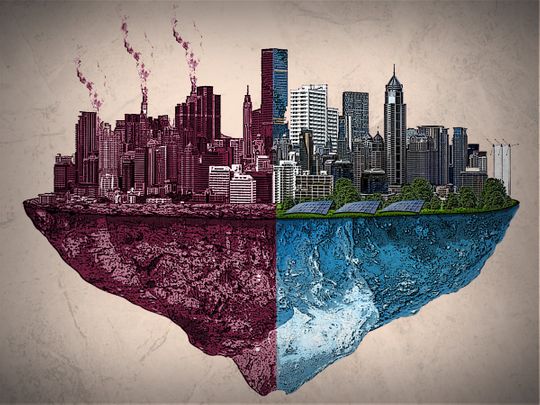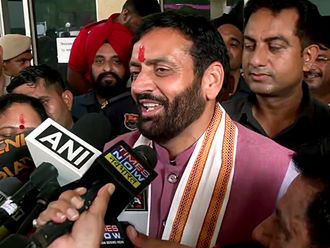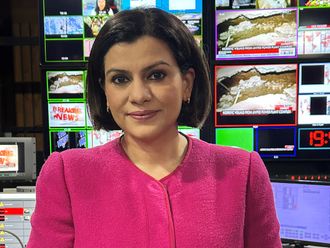
Sectarianism may remain the comfort zone of Lebanon’s ruling elite, but if unchecked, it will become a big problem.
In his iconic poem, Pity the Nation, at once a sardonic and chilling indictment of fractious politics in his ancestral homeland, Khalil Gibran, the Lebanese American poet, writer and visual artist, asked us to “Pity the nation divided into fragments/ each fragment deeming itself a nation”, a nation that, by relying on outsiders for its self definitions, “Wears a cloth it does not weave/ eats bread it does not harvest/ and drinks wine that flows not from its wine press”.
This is as anguished an outcry about Lebanon’s descent into social anarchy, economic despair and sectarian conflict in our time as it was in 1934, when the poem was published posthumously two years after Gibran’s death.
As we speak, Lebanon is divided. It is destitute. It is dysfunctional. And if no one appears to have a solution at hand, it is very simply because the country’s ruling elite, to whom parochial interests trump national ones, are not only loathe to look for one but seem to spare no effort to prevent one from being sought.
A Kafkaesque saga
If this is not evocative of a Kafkaesque saga, I don’t know of what other nightmarish storyline it is evocative of. For how else to describe a governmental system dominated by sectarian blocks that want to impede any serious investigation by the judiciary — a subsystem of the very system of government they putatively lead — of the Aug. 4, 2020 Beirut Port explosion, that killed 200 people, left thousands homeless and destroyed large swaths of the country, an elite that are hell-bent on ensuring that investigation will go nowhere if it threatens to expose acts of malfeasance by them?
The end result of this culture of entitlement and immunity will assuredly prevent the law from holding anyone of consequence — read, anyone in power — accountable. In fact, at a cabinet meeting last Wednesday, Hizbollah, one of these blocks, demanded that the judge in charge be replaced, threatening that he and other cabinet members would stage a walkout if the demand were not met.
All this points to the existence in Lebanon of a parallel state, effectively a state within a state, complete with its own armed forces, institutional structures and political agendas, led by powerful figures free to defy normal political behaviour and to evince contempt for the rule of law.
And, yes, never mind that the people have the right to know exactly what happened on that dreadful day and to finally find closure.
Tayhouneh roundabout — a fault line
You will recall how supporters of this system held what they called a “peaceful march” in downtown Beirut last week, bringing with them rocket propelled grenades, Kalahnikovs and small arms, which triggered hours of fighting that then spread from the Tayhouneh roundabout — a fault line between competing sects during the 1975-1990 civil war, similar to other fault lines that continue to this day to criss-cross streets, neighbourhoods and indeed the government’s corridors of power in the nation’s capital — to other parts of the city.
You might or might not want to trace the root cause of Lebanon’s present woes — which have rattled not only the people of Lebanon but those of the entire region — to the flawed political system established there by the French Mandate authorities in 1942, which apportioned representation in government to the various — in Lebanon, the many — sects that made up the ethnically homogeneous but religiously heterogeneous population.
I for one do. Sectarianism, especially of the kind Lebanon’s ruling classes evince, that is, packaged in the garb and glove of parochialism, has always acted not just as a blow to the social stability of nations but also as a trigger for bloody conflict.
We’ve all been aware, since our freshman year at college studying Political Science 101, that manifestations of it are not unique to any one people, any one era or any one culture. In their history, Europeans suffered more from it than they care to admit.
Series of bitter, blood-soaked sectarian wars
Consider how in the early 1560s, for example, France, then a kingdom, descended into a series of bitter, blood-soaked sectarian wars that lasted for well over two decades, pitting Catholics against Protestants; and beginning in 1618, Germany, then a part of the Holy Roman Empire suffered through the horrors of the Thirty Years War, at a heavy cost in blood and treasure.
Other sectarian wars continued to erupt and sectarian tensions to simmer elsewhere in Europe for centuries.
In our time, there are several such conflicts — some religious in form but actually political in content — rending countries in our region. But no one country among them is most at danger of coming apart at the seams than Lebanon.
Few of us expect an outbreak of another civil war there, but if the political gridlock, the massive financial collapse and the breakdown in public serves are not attended to — and soon — then death by a thousand cuts awaits Lebanon, the Lebanon we all love, the Lebanon that this columnist grew up and acquired his original leap to a maturing consciousness in.
How awful is that? Very.
— Fawaz Turki is a journalist, academic and author based in Washington. He is the author of The Disinherited: Journal of a Palestinian Exile








